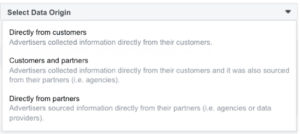Facebook’s New Policies for Custom Audiences
February 15, 2022 by
As Facebook works to regain public trust, they’ve begun rolling out changes to how advertisers can leverage data within the Facebook advertising ecosystem.
Previous Custom Audience Policies

Agencies and advertisers breathed a sigh of relief with Facebook’s June 13th, 2018 announcement regarding custom audiences. Beginning on July 2nd of 2018, Facebook began new policies for their “Custom Audiences” advertising
product.
In the past, Facebook focused their audience targeting on the advertising side. That’s where the money lives. Developing targeting solutions for publishers is a natural progression for Facebook. Getting users more engaged with content that’s more relevant to them should increase engagement with Facebook, and therefore create more ad revenue.
The End of Partner Categories
The first change to take place is the phased removal of Partner Categories, which will occur over the next six months. The previous program allowed advertisers use pre-built audience segments inside Facebook that were created by data platforms such as Experian and Acxiom.
The new change is that Facebook will no longer allow these companies to populate these audience segments inside the Facebook ad platform targeting. Instead, the advertiser must use Facebook’s targeting segments or import their own data through “Custom Audiences.”
Facebook acknowledges that using third-party data sets from companies like Acxiom and Experian is a common practice in their March 28th announcement, but they’ll be shutting them down as a step towards greater privacy compliance. For an interesting take on this move, read John Battelle’s post, “Facebook: Tear Down This Wall”.
Opted-In Data for Custom Audiences
The second change, which has not taken effect yet and is still undefined by Facebook, concerns the Custom Audiences mentioned above. The best indication we have of Facebook’s upcoming direction is their new Custom Audience terms, which go into effect on May 25th. These new terms still allow the uploading of data as custom audiences, as long as:
- The data is opted-in for use, and the advertiser/agency confirms that prior to upload. This has always been the case, with Facebook expected to make this more prominent in the future.
- An advertiser or agency uploads the data directly to the advertiser’s own account.
- The advertiser can no longer transfer custom audiences to other accounts.
While the exact mechanics of how Facebook will roll out changes to “Custom Audiences” remain unclear, it looks like they do plan to continue offering advertisers the ability to upload opted-in data for use in custom audiences.
The option to create “custom audiences” is a campaign tactic that lets advertisers upload a list of phone numbers, email addresses, mobile advertising identifiers, and a few other data points to Facebook, which then matches the list against their existing user base. This lets advertisers create relevant audiences from their own data as well as other data sources.
What the ad industry was uncertain about, but is now confirmed, is that Facebook would shift the use of third-party data outside their platform, away from Partner Categories and towards Custom Audiences.
In the new process, advertisers will be presented with a dialog asking them to verify the source and opted-in status of their data. The opt-in status has always been a requirement per Facebook’s terms, but it will now be more prominent when creating campaigns. Facebook users will also have more visibility into why they’re receiving a particular ad.

This approach seems built to shift responsibility to an advertiser, and subtly reinforce the value of working with Facebook’s first-party directly. It also remains unclear how Facebook will determine if an advertiser answers truthfully about their data, but it allows Facebook to wash their hands, as much as they can, from culpability.
Finally, it’s a tacit acknowledgment from Facebook that advertisers rely heavily upon third-party data for ad targeting. We expect to see advertisers shift their focus to using Custom Audiences instead of Partner Categories for campaigns that need targeting capabilities beyond what Facebook provides today.
Custom Audience Targeting
For everyone else that wants their audience to stick around their site or app, are you serving the best content and the most relevant advertising to your users? Do you even have the first step completed—tools to understand your audience?
Having spent years developing and managing hundreds of apps for media companies and app publishers, our team at Reveal Mobile realizes the complexity and difficulty of audience targeting. We also understand how important this data is to be able to compete in today’s digital economy.
Learn more about creating custom audiences—request a demo.

